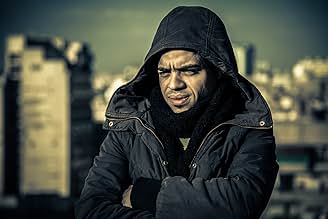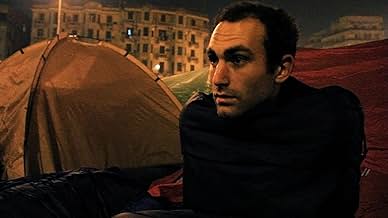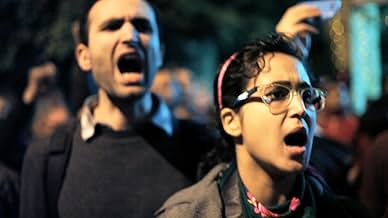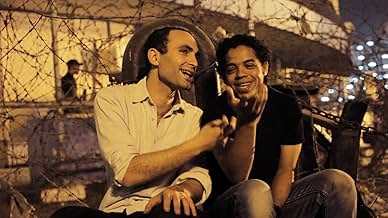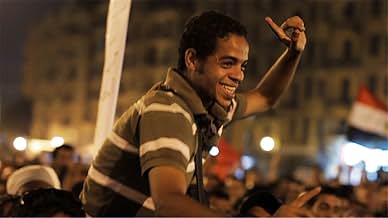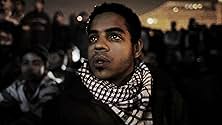IMDb RATING
8.0/10
9.5K
YOUR RATING
A group of Egyptian revolutionaries battle leaders and regimes, risking their lives to build a new society of conscience.A group of Egyptian revolutionaries battle leaders and regimes, risking their lives to build a new society of conscience.A group of Egyptian revolutionaries battle leaders and regimes, risking their lives to build a new society of conscience.
- Nominated for 1 Oscar
- 16 wins & 16 nominations total
Aydah El-Kashef
- Self - Revolutionary
- (as Aida El Kashef)
Featured reviews
The moment the film started, my blood was running at a high-octane buzz. As someone who cares deeply about social movements in general and the Middle East specifically, I was elsewhere through the beginning of the Egyptian Revolution, so learned many of the details from this film firsthand. The story is long, chaotic, and without definitive resolution, just like the moment it follows. That is its strength, and its legacy.
We meet 5 courageous characters, a variety of Egyptians, and we learn why they devoted the last two years of their lives to protesting in the square. The way they speak about their country is heartbreakingly direct, and when they suffer for their goals it's heartbreaking. Interesting, too, is the balance of art, protest, technology, discussion, and music in the protester's toolkits. The picture is up-close, traumatic, and fast-paced, which was all the better. When a story is ongoing, I don't want a portrait with clear summaries and 20/20 hindsight. I want the information that the revolutionaries had as they made their decisions.
We meet 5 courageous characters, a variety of Egyptians, and we learn why they devoted the last two years of their lives to protesting in the square. The way they speak about their country is heartbreakingly direct, and when they suffer for their goals it's heartbreaking. Interesting, too, is the balance of art, protest, technology, discussion, and music in the protester's toolkits. The picture is up-close, traumatic, and fast-paced, which was all the better. When a story is ongoing, I don't want a portrait with clear summaries and 20/20 hindsight. I want the information that the revolutionaries had as they made their decisions.
this movie really touched me. it showed the real story. the story has almost been forgotten because of the media,the ruling regime,the soldiers of the old regime ... As an Egyptian and as a participant in the revolution since the 28th of January 2011,I can tell that this movie shows one of the most honest images of the revolution as well as a complete one,of course some events were dropped, but as an overall all major events and the complete story- line of the revolution has been told. Despite being a documentary,it is also very clear that the movie reserved the thriller and the spirit in every single moment. can't agree more about all the opinions stated in it. can't agree more about the sequence and the severity and reactions of the events showed in. But our (the Egyptians) major problem until now is that after 3 years we didn't accomplish the demands and the requests of the revolution. I hope there would be more parts of this movie,more parts until we reclaim our freedom and demands.
Director Jehane Noujaim delivers a riveting documentary with "The Square,"which manages to powerfully convey the chaos, complexity, and inherent dangers of a Revolutionary movement. The film boldly provides a perspective unattainable by journalists, and the activity recorded from 2011 to 2013 captures the passion and defiance of a movement first hand. The fight for a democratic Egypt is far from over, which is part of what makes the film so dynamic and riveting.
"The Square" is a documentary that traces the events of Egypt's Tahrir Square protests beginning in early 2011 when millions of people took to the streets to demand the removal of President/Dictator Hosni Mubarek, who held power for 30 years. However, when Mubarek is overthrown, the army steps in to temporarily take over the countries affairs, but does not follow through with their promises to its citizens.
After a free and fair election, the military fascist dictatorship is essentially replaced by a religious fascist dictatorship under President Morsi of the Muslim Brotherhood. Once again, the protesters unite and return to the Square to face a violent military oppression. It's a harrowing narrative of people twice betrayed: once by the army and again by militant Islamists who insist on a constitution based on religion instead of secularism.
Noujaim tells the story primarily through focusing on three activists, all of whom are friends. A charismatic, young artist named Ahmed Hassan, a British accented actor- turned activist Khalid Abdalla ("United 93"and "The Kite Runner"), and a family man Magdy Ashour, who is a member of the Muslim Brotherhood who finds his loyalties to his friends tested. The film's storyline follows the revolutionaries through the euphoria of victory, followed with the uncertainties and dangers while under military rule that threatens the politics of democracy.
"The Square" documents the promise and hope of a better future at the beginning, but by the end, you are left with an overwhelming sense of opportunities lost. While a more detailed back story of political maneuvering would have provided welcome context, its implications for the future are extraordinary. The revolution is a work in progress, a rebellion against an oppressive regime, and a call to arms for true democratic ideals. Informative international media outlets are few, and international news rarely generates much interest in the US. Ever more so it's the courageous filmmakers recording history with hand-held cameras that are filling the void.
"The Square" is a documentary that traces the events of Egypt's Tahrir Square protests beginning in early 2011 when millions of people took to the streets to demand the removal of President/Dictator Hosni Mubarek, who held power for 30 years. However, when Mubarek is overthrown, the army steps in to temporarily take over the countries affairs, but does not follow through with their promises to its citizens.
After a free and fair election, the military fascist dictatorship is essentially replaced by a religious fascist dictatorship under President Morsi of the Muslim Brotherhood. Once again, the protesters unite and return to the Square to face a violent military oppression. It's a harrowing narrative of people twice betrayed: once by the army and again by militant Islamists who insist on a constitution based on religion instead of secularism.
Noujaim tells the story primarily through focusing on three activists, all of whom are friends. A charismatic, young artist named Ahmed Hassan, a British accented actor- turned activist Khalid Abdalla ("United 93"and "The Kite Runner"), and a family man Magdy Ashour, who is a member of the Muslim Brotherhood who finds his loyalties to his friends tested. The film's storyline follows the revolutionaries through the euphoria of victory, followed with the uncertainties and dangers while under military rule that threatens the politics of democracy.
"The Square" documents the promise and hope of a better future at the beginning, but by the end, you are left with an overwhelming sense of opportunities lost. While a more detailed back story of political maneuvering would have provided welcome context, its implications for the future are extraordinary. The revolution is a work in progress, a rebellion against an oppressive regime, and a call to arms for true democratic ideals. Informative international media outlets are few, and international news rarely generates much interest in the US. Ever more so it's the courageous filmmakers recording history with hand-held cameras that are filling the void.
'It's less a need for a leader and more for a conscience'--quote from one of the revolutionaries I have yet to see "The Act of Killing" and "20 Feet From Stardom", so I cannot say that "The Square" should be the Oscar winner for Best Documentary Feature. However, I have a hard time imagining a documentary better than "The Square". It's what a documentary should be--it involves the viewer, fills them with anger about a problem and offers some sort of hope.
"The Square" is a film about the Egyptian Revolution--something that is not yet complete and is in its third year. The film traces the steps that have occurred from the standpoint of folks who have staged sit-ins at Tahrir Square. The Revolution occurred because, quite simply, folks were sick and tired of the repression, torture and violence done by the Mubarak military-backed regime. At first, all groups opposed to the government banded together--they all wanted change. However, through the course of the Revolution, those opposing the government soon fell into two camps--the Muslim Brotherhood (which wanted a government based on Sharia law; i.e., a strict theocracy) and the rest who were pushing for democratic freedoms. And, sadly, as the process continued, the Brotherhood soon allied itself with the military. It seemed that individual freedom was NOT what the organization was about after all--they just wanted power for themselves and not the other dissidents. What's to happen? After all, the leader of the Brotherhood has just been elected president and the legislature is controlled by them as well. Well, oddly, the democratic groups had one final ally--the military!! Weird, as now the military is back in control--and with the consent, for now, of the democracy movement! Obviously, the Revolution is far from over.
The film is a must-see for everyone, as the news media here in the US has done a terrible job covering the events. And, too often, they just parrot the administration's assertion that the Brotherhood is a representative government. It's also a must-see because it shows various sides of the conflict and is highly informative. Additionally, you really have to admire the filmmakers--they could have easily been killed filming some of the scenes. Exceptional.
"The Square" is a film about the Egyptian Revolution--something that is not yet complete and is in its third year. The film traces the steps that have occurred from the standpoint of folks who have staged sit-ins at Tahrir Square. The Revolution occurred because, quite simply, folks were sick and tired of the repression, torture and violence done by the Mubarak military-backed regime. At first, all groups opposed to the government banded together--they all wanted change. However, through the course of the Revolution, those opposing the government soon fell into two camps--the Muslim Brotherhood (which wanted a government based on Sharia law; i.e., a strict theocracy) and the rest who were pushing for democratic freedoms. And, sadly, as the process continued, the Brotherhood soon allied itself with the military. It seemed that individual freedom was NOT what the organization was about after all--they just wanted power for themselves and not the other dissidents. What's to happen? After all, the leader of the Brotherhood has just been elected president and the legislature is controlled by them as well. Well, oddly, the democratic groups had one final ally--the military!! Weird, as now the military is back in control--and with the consent, for now, of the democracy movement! Obviously, the Revolution is far from over.
The film is a must-see for everyone, as the news media here in the US has done a terrible job covering the events. And, too often, they just parrot the administration's assertion that the Brotherhood is a representative government. It's also a must-see because it shows various sides of the conflict and is highly informative. Additionally, you really have to admire the filmmakers--they could have easily been killed filming some of the scenes. Exceptional.
Greetings again from the darkness. This is the third of this year's five Oscar nominated documentaries I have seen, and thanks to the historic Texas Theatre, I'll get to see the last two as well. This one is directed by Cairo born and Harvard educated Jehane Noujaim. She sets out to capture the Egyption Revolution, as part of the Arab Spring, and now in it's third year. This is a look from inside the core of the revolution, not a washed-over CNN report.
It should first be noted that this revolution began as more of a protest. Citizens just fed up with the Mubarek regime began congregating in Tahrir Square in hopes of influencing change and a transition to a society of conscience. Ms. Noujaim and her multitude of cameras follows a hand full of these protesters and the changes that occur inside the revolution. These changes occur as Mubarek falls, the military takes over and betrays the movement, and then the Muslim Brotherhood takes control when Mohamed Morsi wins the election. This causes the loss of solidarity in the movement as it becomes clear that the Brotherhood consorted with the military to gain power, proving their mission was quite different.
One of the faces of the revolution is Egyptian actor Khalid Abdalla who you might recognize from the fine 2007 film The Kite Runner. Abdalla speaks excellent English and is clearly passionate about the vision. His comments also drive home the difference in a protest and the politics of a true revolution. We only get a couple of on camera comments from government and military officials, but the real insight and spirit of the film is captured in the faces, words and actions of those involved in the sit-ins, despite the many violent attempts to shut them down.
The most staggering visual comes from an aerial view of Cairo as the camera captures the masses as they descend on the streets during the third uprising that we see. It's breathtaking and in stark contrast to the news reports we saw in the U.S. Unfortunately, there is still no resolution in this as Egypt is still in flux and preparing for yet another election. That brings even more power to the "in the moment" point of view that this film delivers. http://moviereviewsfromthedark.com/
It should first be noted that this revolution began as more of a protest. Citizens just fed up with the Mubarek regime began congregating in Tahrir Square in hopes of influencing change and a transition to a society of conscience. Ms. Noujaim and her multitude of cameras follows a hand full of these protesters and the changes that occur inside the revolution. These changes occur as Mubarek falls, the military takes over and betrays the movement, and then the Muslim Brotherhood takes control when Mohamed Morsi wins the election. This causes the loss of solidarity in the movement as it becomes clear that the Brotherhood consorted with the military to gain power, proving their mission was quite different.
One of the faces of the revolution is Egyptian actor Khalid Abdalla who you might recognize from the fine 2007 film The Kite Runner. Abdalla speaks excellent English and is clearly passionate about the vision. His comments also drive home the difference in a protest and the politics of a true revolution. We only get a couple of on camera comments from government and military officials, but the real insight and spirit of the film is captured in the faces, words and actions of those involved in the sit-ins, despite the many violent attempts to shut them down.
The most staggering visual comes from an aerial view of Cairo as the camera captures the masses as they descend on the streets during the third uprising that we see. It's breathtaking and in stark contrast to the news reports we saw in the U.S. Unfortunately, there is still no resolution in this as Egypt is still in flux and preparing for yet another election. That brings even more power to the "in the moment" point of view that this film delivers. http://moviereviewsfromthedark.com/
Did you know
- TriviaThe film is both the first Kickstarter (crowd-sourced) film to be nominated for an Oscar, but it is also the first film released by Netflix to receive a nomination.
- Quotes
Ahmed Hassan - Revolutionary: We're not looking for a leader as much as we're looking for a conscience. What is a leader anyway? Are they going to offer solutions from the heavens? They won't do that. The thing is, if we are able to create this conscience within the society, we'll be able to find a good president. We are not looking for a leader to rule us.
- ConnectionsFeatured in The 2014 Film Independent Spirit Awards (2014)
- How long is The Square?Powered by Alexa
Details
- Release date
- Countries of origin
- Official sites
- Languages
- Also known as
- The Square
- Filming locations
- Tahrir Square, Cairo, Egypt(the main location)
- Production companies
- See more company credits at IMDbPro
Box office
- Budget
- $1,500,000 (estimated)
- Gross US & Canada
- $124,244
- Opening weekend US & Canada
- $16,359
- Oct 27, 2013
- Gross worldwide
- $124,244
- Runtime1 hour 48 minutes
- Color
Contribute to this page
Suggest an edit or add missing content








